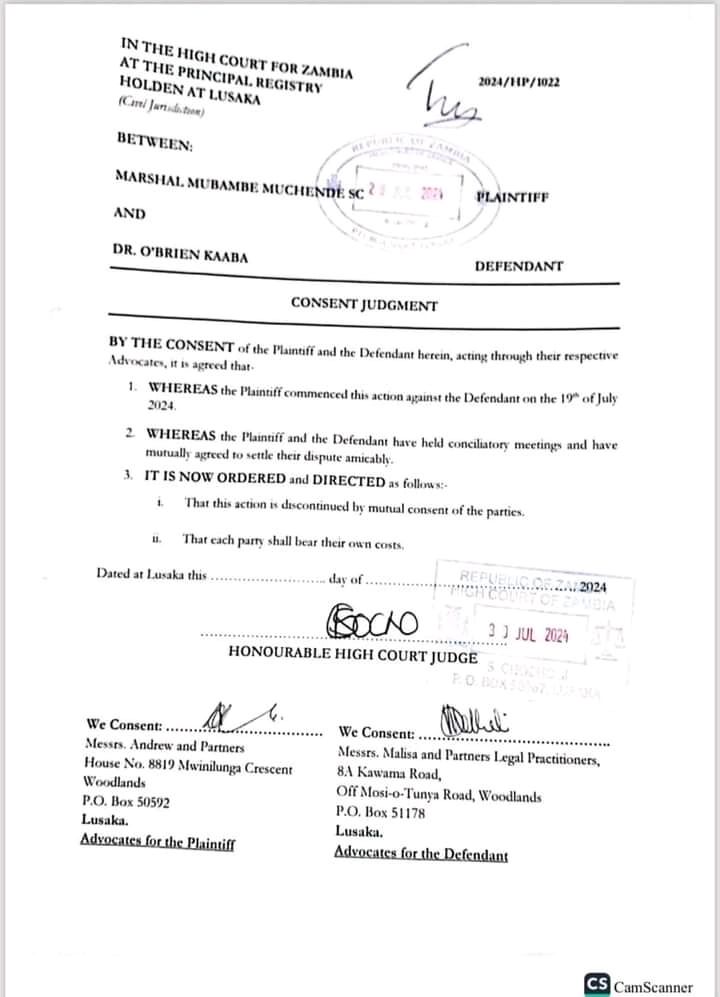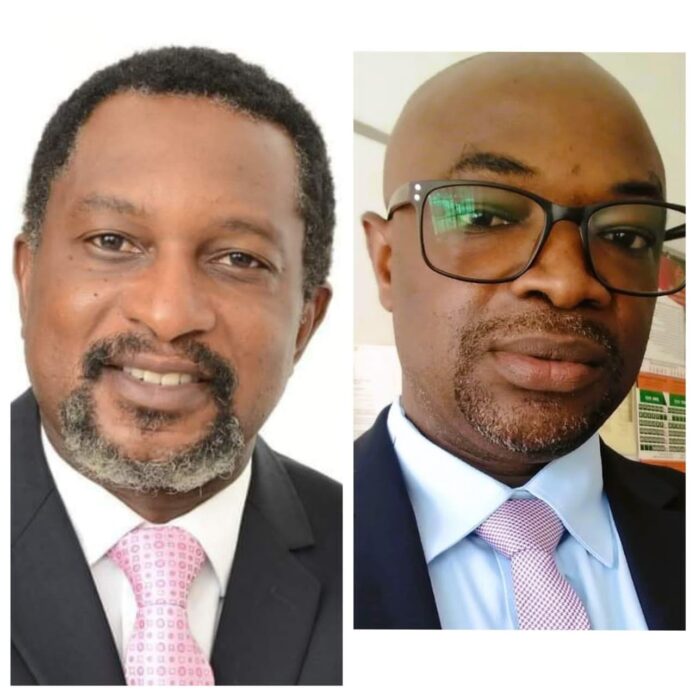It is much easier to give up on Zambia than to fight for her
By Sishuwa Sishuwa
It is ironic that University of Zambia law lecturer O’Brien Kaaba, who had claimed that Solicitor General Marshal Muchende is corrupt and had evidence of this corruption that he was looking forward to presenting in court, has now joined President Hichilema in protecting the very person Kaaba had told Zambians was corrupt. Why has Kaaba struck a deal with someone he branded corrupt? Having criticised consent judgement as a form of legal corruption, Kaaba has now signed one himself to protect someone he told Zambians was receiving kickbacks.
Moreover, the consent judgement was unnecessary. If Marshal wanted, for whatever reason, to discontinue the suit, he could have done so without Kaaba’s consent. Kaaba could have simply insisted that he had evidence to prove his assertions and left it to Muchende to discontinue the matter on his own volition. This way, the public would have concluded that the defamation case that Marshal brought against Kaaba was nothing more than an intimidation tactic. By agreeing to end the matter through a dubious consent judgement, Kaaba has called into question his own character.
The implication of what Kaaba has done is that he either (i) did not have evidence of corruption against Marshal and was simply being malicious; (ii) was talked out of the issue of exposing Marshal’s corruption by Marshal himself, Hichilema, or/and other senior leaders who may have felt that a court trial would expose the extent of the rot and embarrass the President, government, or the ruling party, (iii) has been intimidated by Hichilema who has shown extraordinary determination to protect the Solicitor General, or (iv) has finally been compromised and co-opted into the corrupt network so that he, too, can eat with the group. Whatever it is, neither reflects very well on Kaaba’s character. This outcome presents him as an unprincipled person and a coward who trembles in the face of intimidation or pressure.
It is fair to assume that we will not hear Kaaba strongly criticising the government anytime soon. He is more likely to withdraw into silence to win the support of those he nearly estranged himself from by criticising their wrongs. It is worth noting that the decision by Kaaba – who, like Marshal and Hichilema, is a Tonga speaker – to strike a consent judgement with an official he had only days earlier insisted was corrupt may also be interpreted by some people as motivated by ethnic considerations. In the book It’s Our Turn To Eat: The Story of a Kenyan Whistleblower, Michela Wrong shows that corruption, despite its destructive impact, is harder to eradicate in multi-ethnic African societies because many people, both in government and outside it, have found it easy to reduce decision-making to the self-serving calculation of which tribes gets to ‘eat’.
Set in Kenya, the book tells the story of John Githongo, a member of the Kikuyu ethnic group to which then President Mwai Kibaki also belonged, who took on an official government position to fight corruption. When Githongo discovered that corruption under Kibaki was as rife as it was under his predecessor, Daniel Arap Moi who came from the Kalenjin group, he exposed it. Githongo’s anti-corruption efforts attracted outrage from (mainly the corrupt) Kikuyu government officials who felt disappointed that a member of their ethnic group was ‘betraying the tribe’ and effectively undermining the ruling party’s stay in power at a time when they (ethnic Kikuyus) should unite to eat, as those they had ousted from power, the Kalenjin, had done.
Considered from this perspective, it is reasonable to assume that Hichilema, Marshal, or other Tonga elders may have sat Kaaba down and reproached him for “betraying the tribe and effectively undermining the ruling party’s stay in power at a time when they…should unite to eat, as those they had ousted from power…had done.” For those who place narrow ethnic considerations above wider national interests, the pressure of ethnic-regional cabals is almost unbearable, and weak souls are more likely to bend to their will. In fact, I won’t be surprised to hear next that Kaaba has entered into another consent judgement with, or issued an apology to, ex-ACC Director General Thom Shamakamba and retracted the assertions he intentionally made to the Daily Revelation newspaper that Thom was also receiving kickbacks! Politics can reveal the truest character of people we had some respect for at a distant.
Here is my unsolicited advice to Kaaba. If you are not consistent in your beliefs; if you are not prepared to risk everything – including your very life – to live the dictates of your conscience and give full expression to the courage of your convictions, please stick to supporting Hichilema and the UPND or consider withdrawing from public commentary to lead a quiet life until Zambia has a different, non-ethnic Tonga, leadership. It is the easy way out, provided one is prepared to ignore the answer to this haunting question, which will likely be posed by future generations: ‘When these things were happening to Zambia, when those in power were destroying the country this way, what did you do?’ The price of dissenting, of challenging the government, of being in the minority, is very high. I know this from personal experience under this administration and previous governments. It is much easier to give up on Zambia than to fight for her.
Speaking truth to power is a lonely undertaking, but someone must take the mantle and sacrifice. If there is anything that I have learnt from this path, it is that sometimes, in acting our beliefs and being loyal to principle or our convictions, we lose friends and end up lonely. I do understand though – and I am even sympathetic to – the primary impulses that are causing individuals including those in civil society today to betray public interest and identify themselves with the ruling elite. In an impoverished country like Zambia, where the state is the dominant employer, the ability to stay alive requires association with the government of the moment.
I believe, however, that there must be others among us who should do what is right and work towards the promotion of the common good. Some among us must hold our leaders to account, irrespective of the consequence that may come our way. It would be nice to have more people, especially from the region where I come (since the leaders now dividing Zambia hail from there), who genuinely oppose corruption, defend democracy, speak truth to power and campaign against the erosion of democratic institutions. But even if there are only one or two of us, we must find comfort in the fact that we are enough. We are enough because at its core, our job is very simple. It is to be the pinhead of the needle of justice and clean governance. Our job is to give courage to those who are scared. We do not have to be too many for that; we are enough. The cowards will join eventually; they always do.
This is a very historic and difficult period for Zambia we are witnessing and passing through. Many, including those we looked up to only yesterday, have now sold out and those in power have supporters that are so loud against the few remaining independent voices that it is very easy to feel overwhelmed, shuttered and to either break down or bow down to defeat. Mistakes are inevitable too, sometimes very grievous ones. It is vital to learn lessons from all of them, quickly and effectively, and to soldier on: because victory is certain for those who are steadfastly on the right side of history and consistently fight for justice: it truly is very dark before true dawn. As always, I choose to fight on, on all fronts, whatever the odds, till death or victory, whichever comes first.
We learn and grow every day, and our ability to fight never stops developing and growing. On the face of it, we appear to be in the minority. Actually, we are in the majority; it is just that many are cowards who know and understand the truth and the just path, but are prisoners of fear, fear of many things. When the time is right and their fear can be overcome by numbers, they will support the cause of justice. It has always been like this, historically.
I am really worried about the health of Zambia’s democracy, and the direction of political life. “Sometimes, democracy dies with a bang. But more often, democracies die slowly. In plain sight, at the hands of elected officials. Through the gradual erosion of political norms and institutions”, wrote Steven Levitsky and Daniel Ziblatt in their book, How Democracies Die. I see this process steadily playing out in Zambia, and I recently explained how in the article on the link below.



You dilute your article by adding tribalism. Please it can make better sense if this part of the article is withdrawn.
You are seeing the wood for the trees. The future of Zambia may rely on your kind. Supporting wrongs as not to let the tribe down as Kaaba has done is cowardly.Forget tribal allegiancy and see things clearly. Wrongs are wrongs regardless of party/tribe.
Listen to Shish !!!